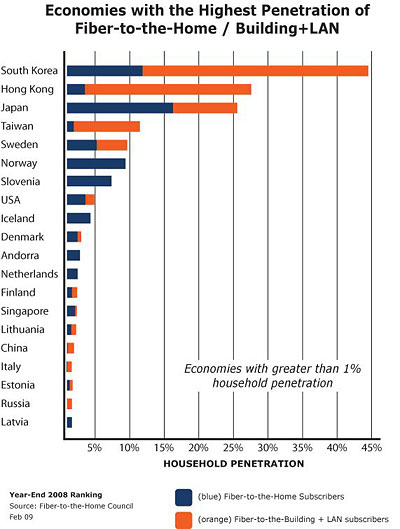
Customers log onto the internet at an inner city internet cafe in Sydney, Australia, on April 7, 2009
With the cities of Sydney and Melbourne constantly jostling for international attention, you'd hardly expect to find Australia's less-metropolitan burg of Brisbane carrying the mantle of the country's most digitally advanced city. Yet new residents in Fernbrooke, a 1,000-home Brisbane suburb, are pacesetters for the rest of the country, enjoying Internet download speeds up to 100 megabits per second — around 100 times the speed currently available to the average Australian. (Read "A Blacklist for Websites Backfires in Australia.")
As Fernbrooke goes, so goes the nation. In April, Australian Prime Minister Kevin Rudd announced a $31 billion plan to build a National Broadband Network (NBN) that will bring fast fiber-optic connections into 90% of the nation's homes, even to towns with as few as 1,000 residents. In doing so, Australia may leapfrog South Korea, which is widely acknowledged as the world's most wired country but where just 44% of residences currently have fiber connections. Less than 5% of U.S. households are wired with fiber-optic cables. (See the 50 best inventions of 2008.)
Rudd launched the NBN construction program as part of government efforts to stimulate Australia's economy, but the network will provide more than jobs. It promises to transform the way Australians work, play, learn and communicate over the eight years it will take to complete. Once the rest of the country catches up to Fernbrooke, Australia will be at the forefront of the digital economy, capable of delivering digital TV, video on demand, e-health and education initiatives, and a host of as yet undreamed of applications. "It will open the floodgates for entrepreneurs," says telecommunications analyst Paul Budde. "I think I'm pretty good at what I'm doing, but I never would have predicted Facebook, Skype or YouTube. The same will apply here."
The Labor government's decision to run fiber to the home (FTTH) also has a political aim: to break the grip of the national carrier, Telstra, on the country's telecommunications sector. The decade-long process of privatizing Telstra ended in 2006, but the company has continued to enjoy the legacy of almost a century as a state monopoly, reaping 90% of the profits from country's $28 billion communications industry.
Telstra's power stems from its stranglehold on the "last mile" of copper wiring to Australian homes, over which most telephone and Internet services are delivered and which rivals must pay to access. By building its own FTTH network, the government will bypass the copper and kick off a new era of competition where Telstra is an equal player on an open-access network. "This will totally change the telco industry and Telstra," says Budde. "Think if the road system was owned by one company that said 'you have to drive these cars.' Without open access to the roads there wouldn't be a transport industry, and the same applies to broadband," he says.
The $31 billion that Australia is spending on the NBN dwarfs the $7.2 billion earmarked in the U.S. stimulus package for broadband network construction. Budde says the administration of U.S. President Barack Obama is taking an "enormous interest" in the NBN initiative because it may hold lessons for America, where U.S. phone companies enjoy competitive advantages similar to Telstra's. "The warning signs are there for AT&T and Verizon," says Budde. "Things won't change overnight, but open networks are coming to America. If the stimulus package works I'm 100% sure they're not going to stop there."

|
The first miles of Australia's new network will be laid in Tasmania as soon as July. The rest of the nation will follow early next year, with the emphasis on tackling black spots and bringing faster connections to rural areas. Ultimately, the network will be capable of data-transmission speeds of up to one gigabit per second, says John Lindsay, carrier relations manager at Internode, an Internet service provider that delivers broadband to Fernbrooke and across Australia. "The network will evolve over a 40-year period," he says. "Fiber is a pretty future-proof technology."
The NBN has been greeted with near unanimous praise by Australia's information-technology industry, but it is not without critics. The opposition Liberal party has slammed the high cost to taxpayers and uncertainty over how the network will be built and financed. But Telstra is a supporter. Two weeks after the NBN announcement, Telstra managing director of communications David Quilty hailed it as "bold and ambitious."
Telstra is expected to be a major investor in the NBN, which the government will build in partnership with the private sector while retaining a majority share. Like any successful telco, Telstra recognizes a good business opportunity — and when the rules of the game have fundamentally changed.
